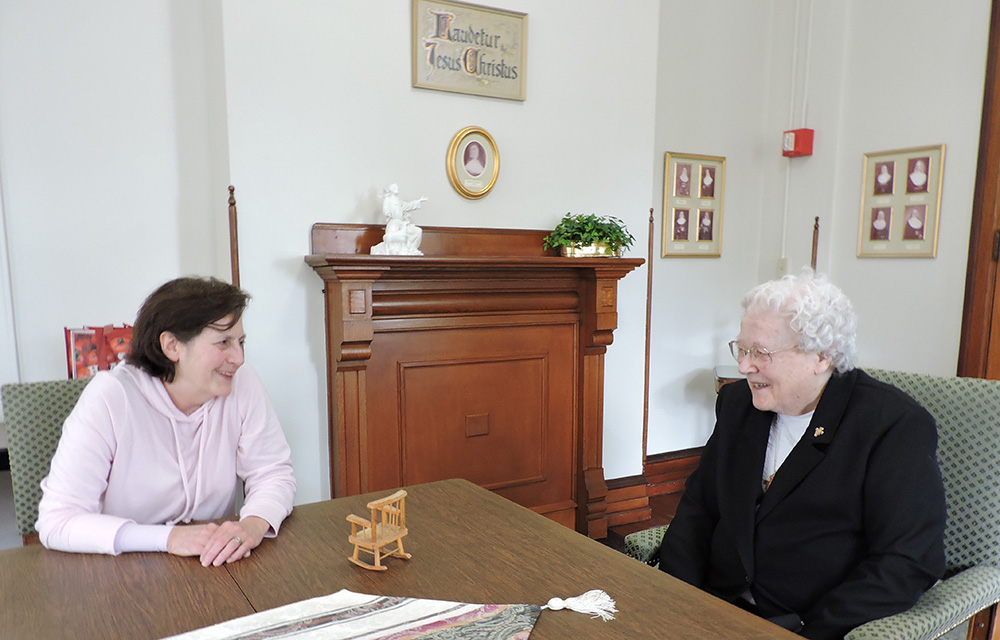
The Sister Margaret Lewis (on the right) talks with Sister Mary Graig in the conference room of the Convent of Our Lady of the Angels in Pennsylvania.
Editor's note: The declining numbers of Catholic sisters in America will come as no surprise to GSR readers. But every loss is significant in itself. In Part 1 of "A Good Death," a two-part series, we asked sisters how their communities address the death of a member. Today, we profile two sisters who face the possibility of death as a daily reality.
Sr. Margaret Lewis, who was first diagnosed with cancer almost 25 years ago, can't take anything stronger than Tylenol for pain due to her allergies, she says. A formidable presence at 90, the Sister of St. Francis of Philadelphia tells other cancer sufferers that the best remedy for pain is not feeling sorry for yourself.
That, and the divine petitions of the women around her, she said in a conversation at Our Lady of Angels Convent in Aston, Pennsylvania, where she now resides after decades of crisscrossing the Mid-Atlantic region when her community needed her. Undeterred by the chronic pain that accompanies her illness, Lewis spends three days a week working next door at Neumann University, which was founded by the sisters. She is a receptionist in the president's office and volunteers with the Institutional Advancement Department.
"The beauty is for me to always be around sisters who are prayer-filled. When they say, 'I'm praying for you," I know they are, and I know I can go the next few feet. It's that support that you feel."
Sitting catty-corner from Lewis at the brown conference table in a visitor's parlor, her younger colleague, Sr. Mary Craig, chimed in. Sr. Mary Beth Antonelli, the order's director of pastoral services and Craig's friend, was also present.
"You feel you are wrapped in prayer," said the 56-year-old Craig, diagnosed with inflammatory breast cancer at 44. "It's a great support to know you are not alone."
Like Lewis, Craig finds strength in her community and in being of service to others. "Being engaged with people somewhere when I'm participating in what God is doing is life-giving."
In 2006, when she first found out she was ill, Craig, who has taught at both the primary and secondary levels,was working at Philadelphia's Little Flower High School.
Eventually, the rounds of chemotherapy took their toll, and she had to leave her post. A spiritual director, she's also served as the novice director for the order's formation team. Currently writing a dissertation for a doctorate in theology, she hopes to teach college students.
Lewis, who scored well on tests as a potential physician at a time when the order wasn't training practicing doctors, instead put her talents to work in other sectors of the medical profession. That included opening a school for medical technologists, working in hospital administration, launching another degree program at Neumann, and earning a Ph.D. along the way. She circled from Maryland to New Jersey to Delaware and sometimes back again.
Whether it was facing down racist threats or sitting by a dying patient's bed, little seemed to intimidate Lewis.
When she accepted black students into the medical technology school in Wilmington, she received threats because of it, she recalled. "I didn't take them because they were African-American, I took people who were qualified. They were the type of professional I needed," she said.
When she had her first bout with cancer in New Jersey, she didn't let it get in the way of a further call. She moved on to Baltimore to help open a cancer institute at a local hospital and worked as a volunteer with patients who were grappling with the same illness. "I got called into hospice and went regularly with them for years. They wanted you to be there when a person died."
Staff also sent her to talk to cancer patients, she said. "I understood what that person was going through." When a patient told her that she couldn't possibly get it, she said, "hold my hand. I think I do."
"I didn't care who they were. I was there to help them through it."
Craig's regimen has included rounds of chemotherapy and hormone treatments, each one with a virtual sell-by date. "It was a given that the (cancer) was going to come back. The question was where and when. I always appreciated the honesty of the doctors. They were always very straightforward (saying), 'this is not going to go away. You have to find a way to live with it.'"
Living with it entailed having a rod put in her spine in 2014 to address the cancer tumors there, and three different chemo regimens since then.
While the current treatment seems to be working, it's hard not to be able to work full time, she said.
As Craig and Lewis share their stories, they keep glancing at each other. Perhaps it's a signal of solidarity between two women who, divided by a generation, share a life-altering experience of an illness that threatens to turn deadly.
At the time Craig was first told she had cancer, the mortality rate for inflammatory breast cancer was five to seven years, she said. Though she had disliked the support group she attended, she did sign up for an experimental group that blended mindfulness with art therapy, she said. Mindfulness was so close to the contemplative practice she was already steeped in.
The most powerful moment she had was sitting in the group of cancer patients, naming the cancer and creating a picture that embodied the pain it caused. "Everyone had a different color for the pain," she recalled, remembering tears around the art table. "We had to give our pieces a title, but there were very few words. We kept the healing atmosphere." All of a sudden, she realized that if she held on to her new perspective, she could see even the cancer as a gift.
In that spirit, before she takes her chemotherapy pill, she says a word of grace, said Craig. "Bless me, oh Lord, for this gift which I am about to receive for your well-being."
When people told her she had to fight the cancer, Craig, who said she's not naturally pugnacious, quailed inside. Instead, she decided to try something different.
A toy-sized chair she found in a store rests in her room where she can see it. "This is where cancer sits," said Craig, who brought the small chair to our meeting. Usually the cancer is quiet, she said, but "sometimes there is something she needs to tell me."
Every day she gets up, unsure of how the day is going to go, said Lewis, but knowing that, though she's a planner, she's gotten to the stage when she must live day to day. "I had to say, 'you can't worry about tomorrow. When tomorrow comes, it will be today.' "
Both women credit their parents with surrounding them with love and strength that still enables them to face up to the challenges of living with chronic illness and pain.
Though all the previous generations of Lewis's family died of cancer before they were 70, her father taught her to accept suffering as a gift, she said. "You must walk the hills of Calvary," he advised her.
Though both of her parents are now dead, they were a great source of strength and her best friends, said Craig. Her father would help her out with practical items, such as providing her with heaping bags of kale when he learned it might be useful in fighting cancer.
In finding meaning and purpose, even during their illness, Craig and Lewis have been gifts to others, said Antonelli. "I would describe them as spiritual women with a deep sense of God in their lives and in their journey. They are women of deep faith."
While both have a lot of inner strength, "the most important thing I've seen is their sense that God is with them in their illness," she said.
Asked if she too believed suffering was a gift, a theme that surfaced repeatedly in the conversation in the convent parlor, she said, "I do believe we learn from suffering. The whole idea of the paschal mystery is that new life does emerge from it. It may not feel like a gift, but it does transform us, taking us deeper into our relationship with God, with self and with others.
"There is no Easter Sunday without a Good Friday. That gives you a sense of hope," said Antonelli.
When she hears them speak about the faith amid suffering, she said, "I feel like I'm on holy ground."





